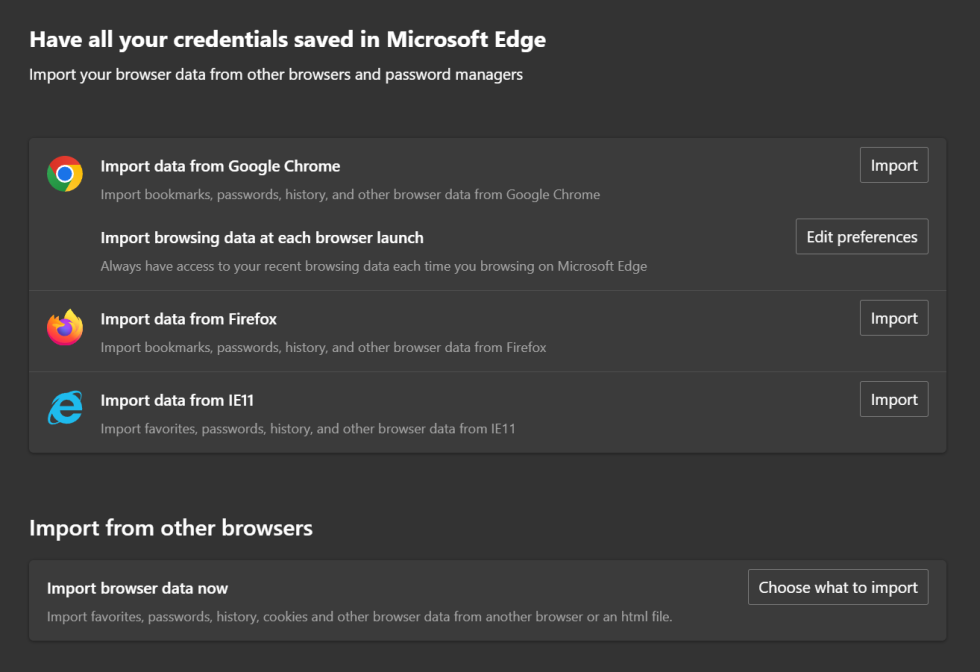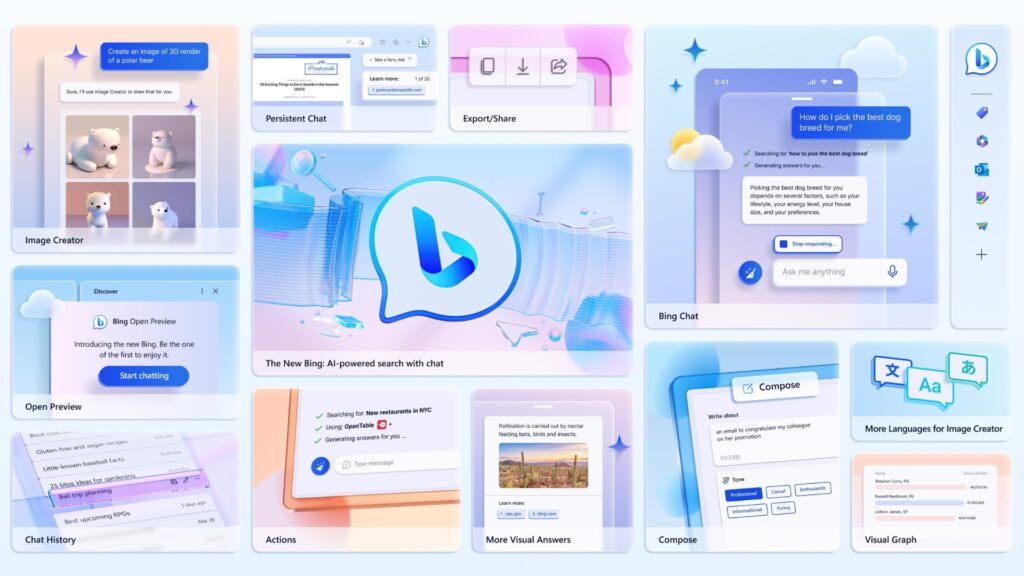-
 chevron_right
chevron_right
Microsoft Edge va vous faire oublier Chrome sur votre vieux PC
news.movim.eu / JournalDuGeek · Wednesday, 29 May - 14:38

 chevron_right
chevron_right
Microsoft Edge va vous faire oublier Chrome sur votre vieux PC
news.movim.eu / JournalDuGeek · Wednesday, 29 May - 14:38

 chevron_right
chevron_right
Microsoft Edge va devenir le meilleur allié des vidéos YouTube
news.movim.eu / JournalDuGeek · Wednesday, 22 May - 14:16

 chevron_right
chevron_right
Microsoft is testing user-controlled RAM limits for Microsoft Edge browser
news.movim.eu / ArsTechnica · Thursday, 4 April - 16:24

Enlarge (credit: Microsoft)
Old-school user-controlled memory management is back, baby!
Or at least it's a feature Microsoft is testing in the newest builds of its Chromium-based Edge browser (via The Verge ). User Leopeva64 on X, formerly Twitter, posted screenshots of an Edge build with a "resource controls" slider for manually limiting the browser's RAM usage. There's also a toggle to set whether you want RAM limits to kick in when you're playing a game, or if you want the limit to be enforced at all times.
It builds on a feature that's already in the stable version of Edge, where the browser will alert you if an individual tab has particularly high memory usage. The minimum limit you can set for Edge appears to be 1GB, and it goes all the way up to the amount of physical memory you have installed in your PC.
 chevron_right
chevron_right
Un faille critique 0-day corrigée dans Microsoft Edge, tous les navigateurs Chromium vulnérables
news.movim.eu / Korben · Friday, 29 March - 09:56 · 1 minute

Alerte rouge dans la galaxie des navigateurs web ! Microsoft vient d’annonce qu’une faille critique 0-day a été découverte dans Edge et corrigée en urgence. Mais attention, cette vulnérabilité ne se limite pas au navigateur de Microsoft puisque c’est toute la famille Chromium qui est touchée !
Google a bien tenté de faire profil bas en publiant discrètement un correctif pour Chrome le 26 mars , sans trop s’étendre sur les détails. Mais c’était sans compter sur la perspicacité de Microsoft qui a mis les pieds dans le plat en confirmant que l’exploit était activement utilisé par des cybercriminels. Aïe !
Baptisée CVE-2024-2883 , cette vilaine faille se cache dans le moteur graphique ANGLE (Almost Native Graphics Layer Engine) utilisé par les navigateurs Chromium pour faire tourner le WebGL. En gros, c’est la porte d’entrée parfaite pour exécuter du code malveillant sur votre machine.
Heureusement, Microsoft a réagi au quart de tour en sortant illico presto la version 123.0.2420.65 d’Edge qui colmate la brèche. Mais attention, si vous utilisez un autre navigateur basé sur Chromium comme Chrome, Brave, Vivaldi ou Opera, vous êtes aussi concernés. Alors, foncez vérifier que vous avez bien la dernière version à jour !
Pour ce faire, rien de plus simple : tapez « chrome://settings/help » (ou l’équivalent pour votre navigateur) dans la barre d’adresse et laissez la magie opérer. Si une mise à jour est disponible, elle sera téléchargée et installée automatiquement. Ensuite, relancez le navigateur et le tour est joué !
Ce n’est pas la première fois qu’une faille 0-day fait trembler le monde des navigateurs. En 2021, une vulnérabilité similaire avait été découverte dans Chrome et avait été activement exploitée pendant des semaines avant d’être corrigée. Un vrai cauchemar pour les utilisateurs et les éditeurs !
 chevron_right
chevron_right
Microsoft fixes problem that let Edge replicate Chrome tabs without permission
news.movim.eu / ArsTechnica · Friday, 16 February - 20:56 · 1 minute

Enlarge (credit: Microsoft)
Microsoft has fixed a problem that resulted in tabs from Google Chrome being imported to Microsoft Edge without user consent, as spotted by The Verge . Microsoft has kept mum on the situation, making the issued update the first time Microsoft has identified this as a problem, rather than typical behavior for the world’s third-most-popular browser.
In late January, The Verge Senior Editor Tom Warren reported experiencing the puzzling Edge issue. After updating his computer, Edge launched with the tabs that Warren most recently used in Chrome. He eventually realized that Edge has a feature you can toggle, reading: “Always have access to your recent browsing data each time you browse on Microsoft Edge.” The setting is reachable in Edge by typing “edge://settings/profiles/importBrowsingData.” Interestingly, it allows Edge to import browsing data from Chrome every time you open Edge, but data from Firefox can only be imported manually. However, Edge was seizing Chrome tabs without this setting enabled. Others reported having this problem via Microsoft's support forum and social media, as well.

The Edge setting as seen on a Windows 11 23H2 system running Edge 122. You can have data continuously imported from Chrome or on demand from Firefox, but other browsers don't appear. (credit: Andrew Cunningham)
Microsoft didn’t respond to The Verge’s initial request for comment, but this week it released an Edge update that seems to address matters. Microsoft's release notes from February 15 say:
 chevron_right
chevron_right
Microsoft trouve l’option « entourer pour chercher » si cool qu’il va la piquer aussi
news.movim.eu / Numerama · Tuesday, 13 February - 09:28

Microsoft marche dans les pas de Samsung et Google. L'entreprise américaine prépare une mise à jour de son navigateur web, Edge, pour inclure une nouvelle fonction basée sur l'IA. Le principe ? Entourer quelque chose à l'écran avec le curseur de la souris pour générer des informations correspondantes.
 chevron_right
chevron_right
Microsoft Edge is apparently usurping Chrome on people’s PCs
news.movim.eu / ArsTechnica · Tuesday, 30 January - 17:52 · 1 minute

Enlarge (credit: Aurich Lawson | Getty Images )
If you run the Chrome browser in Windows 10 or 11 and you've suddenly discovered that you're running Microsoft Edge instead, you're not alone. The Verge's Tom Warren reports that he and multiple other users on social media and Microsoft's support forums have suddenly found their Chrome browsing sessions mysteriously replicated in Edge.
Without an official comment from Microsoft, Warren posits that the tab-snatching happened because of a bug or an inadvertently clicked-through dialog box that triggers a feature in Edge that's meant to make it easier to (intentionally) switch browsers. The setting, which can accessed by typing edge://settings/profiles/importBrowsingData into the browser's address bar, offers to import recent browsing data from Chrome every time you launch Edge, as opposed to the one-time data import it offers for Firefox.
Assuming it is a bug, this data-importing issue is hard to distinguish from some of Microsoft's actual, officially sanctioned, easy-to-reproduce tactics for pushing Edge. I encountered two of these while installing Chrome on a PC for this piece—one when I navigated to the Chrome download page and another across the top of Edge's Settings pages after I had set another browser as my default.
 chevron_right
chevron_right
Plugins, historique… Bing avec ChatGPT fait le plein de nouveautés
news.movim.eu / Numerama · Thursday, 4 May, 2023 - 11:02

Abonnez-vous aux newsletters Numerama pour recevoir l’essentiel de l’actualité https://www.numerama.com/newsletter/